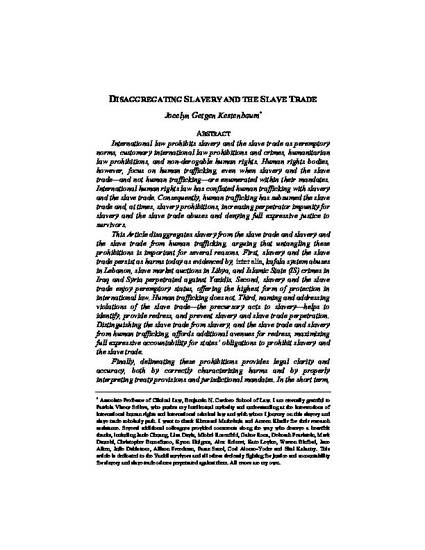
International law prohibits slavery and the slave trade as peremptory norms, customary international law prohibitions and crimes, humanitarian law prohibitions, and non-derogable human rights. Human rights bodies, however, focus on human trafficking, even when slavery and the slave trade—and not human trafficking—are enumerated within their mandates. International human rights law has conflated human trafficking with slavery and the slave trade. Consequently, human trafficking has subsumed the slave trade and, at times, slavery prohibitions, increasing perpetrator impunity for slavery and the slave trade abuses and denying full expressive justice to survivors.
This Article disaggregates slavery from the slave trade and slavery and the slave trade from human trafficking, arguing that untangling these prohibitions is important for several reasons. First, slavery and the slave trade persist as harms today as evidenced by, inter alia, kafala system abuses in Lebanon, slave market auctions in Libya, and Islamic State (IS) crimes in Iraq and Syria perpetrated against Yazidis. Second, slavery and the slave trade enjoy peremptory status, offering the highest form of protection in international law. Human trafficking does not. Third, naming and addressing violations of the slave trade—the precursory acts to slavery—helps to identify, provide redress, and prevent slavery and slave trade perpetration. Distinguishing the slave trade from slavery, and the slave trade and slavery from human trafficking, affords additional avenues for redress, maximizing full expressive accountability for states’ obligations to prohibit slavery and the slave trade.
Finally, delineating these prohibitions provides legal clarity and accuracy, both by correctly characterizing harms and by properly interpreting treaty provisions and jurisdictional mandates. In the short term, playing “fast and loose” with distinct prohibitions undermines international law’s institutional legitimacy. In the long term, state practice and opinio juris that moves away from enforcing against slavery and slave trade harms might lessen or even erode these protective customary international law prohibitions.
- Fishing,
- Industry,
- Law of the Sea,
- Biography,
- Legal History,
- Politics (General),
- Slavery,
- Race and Ethnicity Issues,
- International Law
Available at: http://works.bepress.com/jocelyn-kestenbaum/73/
